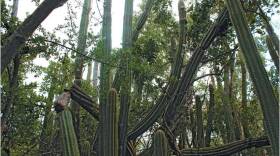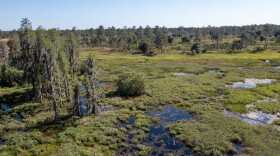-
The surge is startling scientists, amplifying impacts such as hurricane storm surges and nuisance flooding and testing mitigation measures like the Resilient Florida program.
-
A newly published paper suggests the incredibly rare Key Largo tree cactus species is locally extinct. Researchers believe sea level rise was the main culprit.
-
After last year's lethal marine heat wave, coral scientists are looking at ways to help coral survive another potential round of dangerous bleaching.
-
The new report suggests nearly all coastal communities face the threat of significant "critical infrastructure" impacts over the next 25 years.
-
The South Florida ClimateReady Tech Hub, led by the Miami Dade County Office of Innovation and Economic Development, is one of 12 regional tech hubs across the nation that were awarded a total of $504 million by the White House.
-
Record-shattering ocean temperatures have helped Beryl gain strength as it moves through the Caribbean. It is the most powerful Atlantic hurricane ever recorded this early in the year.
-
The Blue-Green Algae Task Force wants data on the state's strategy for curbing farm-related nutrient pollution.
-
Forecasters say the warming climate pattern El Niño is officially over. Its cooling counterpart, La Niña, could develop as soon as July — just in time to exacerbate an above-average hurricane season.
-
Jeff Berardelli in Tampa and John Morales in Miami say the response from audiences has been mostly positive. Berardelli says, "We're being irresponsible if we're not providing context."
-
This week on The Florida Roundup, we discuss the Florida High School Athletic Association’s approval of NIL deals, a state teacher apprentice program, meteorologists incorporating climate change into forecasts, scientists looking to combat citrus greening, a first for Florida’s space coast, new hurricane forecasting and spelling bee news.
-
The measure is aimed at educating buyers about the intensifying risks, although there are loopholes.
-
Carbon credit programs have come under scientific scrutiny for overstating how much they help the climate.
WUSF
Weekend Edition Saturday
WUSF
Weekend Edition Saturday
Next Up:
10:00 AM
Planet Money and How I Built This
0:00
0:00
Available On Air Stations












